6 Things I’ve Learned About Adoption Now That My Kids Are Older
1. Love Grows.
 I have learned not to be jealous of the relationships my children have with their birth families. I don’t feel threatened by these relationships. I look at them as a positive in my children’s lives and a blessing in mine. There is always room for more love. Who’s going to complain about someone loving their children? For us, family is more than father, mother, sister, and brother. My children feel loved by and look forward to visits from birth families. We owe a debt of gratitude to these birth families for their love and support. It has made a world of difference in our family.
I have learned not to be jealous of the relationships my children have with their birth families. I don’t feel threatened by these relationships. I look at them as a positive in my children’s lives and a blessing in mine. There is always room for more love. Who’s going to complain about someone loving their children? For us, family is more than father, mother, sister, and brother. My children feel loved by and look forward to visits from birth families. We owe a debt of gratitude to these birth families for their love and support. It has made a world of difference in our family.
2. Don’t be judgmental.
 I have learned not to judge or make assumptions about others. Over the years, I have come to know our children’s birth mothers. I have learned that by getting to know them, I understand better where they came from and why they have made certain choices in their lives. Each of them could have provided love to their child but they wanted them to have something they couldn’t give them: an intact family, a safe home, basic necessities of life, or an opportunity for a future. Each birth mother had her own reasons and I respect that.
I have learned not to judge or make assumptions about others. Over the years, I have come to know our children’s birth mothers. I have learned that by getting to know them, I understand better where they came from and why they have made certain choices in their lives. Each of them could have provided love to their child but they wanted them to have something they couldn’t give them: an intact family, a safe home, basic necessities of life, or an opportunity for a future. Each birth mother had her own reasons and I respect that.
3. I don’t have to be perfect.
As I have cared for my children over the years, I have often wondered, “If my child’s birth family could peek into our lives at this very moment, would they be happy with what I am doing?”
That is a lot of pressure. I have felt the need to please so many and do everything just right. What I have learned is that there is no such thing as “just right.” What is right for one child is not necessarily right for another. What one person may perceive as good parenting, someone else may view as bad parenting. Parenting is hard. Parenting is individual. Parenting is trial and error, at times. As I’ve tried to take the pressure off myself and just be me, I have found I am less uptight and a better parent for it.
4. Nature vs. Nurture
 The age-old question: Nature vs. Nurture? I’ve thought a lot about it. One of my daughters has a fear of heights, elevators, escalators, and enclosed spaces. She doesn’t really like meat. As I got to know her birth mother, I found they shared these traits. (In this picture, she is conquering her fear of heights and elevators all at once, visiting the top of the Sears Tower with her birth mother.) This daughter is also exceptionally bright, learns quickly, has a talent for playing instruments, and is athletic. She is motivated and self-driven. I believe some of these talents and abilities have come to her through her DNA.
The age-old question: Nature vs. Nurture? I’ve thought a lot about it. One of my daughters has a fear of heights, elevators, escalators, and enclosed spaces. She doesn’t really like meat. As I got to know her birth mother, I found they shared these traits. (In this picture, she is conquering her fear of heights and elevators all at once, visiting the top of the Sears Tower with her birth mother.) This daughter is also exceptionally bright, learns quickly, has a talent for playing instruments, and is athletic. She is motivated and self-driven. I believe some of these talents and abilities have come to her through her DNA.
I have 2 children with the same birth mother who both tend to get angry quickly, struggle with depression, anxiety, and math, but are really good at art, reading, dancing, and singing. I’ve learned that this mirrors their birth mother’s struggles and abilities.
So where does nurture come into play? I think “nurture” shapes how they deal with their struggles and talents. Do they melt down when they have to ride an elevator or bravely hold the rail in the corner where they feel safe? Do they punch someone when they are angry or walk away to spend some time cooling down? Do they recognize their gifts and pursue their education to improve upon them or let them go as unrealized potential? I have learned that as their parent, it is my responsibility to help them learn how to respond to their nature in appropriate and productive ways.
5. Kids will be kids.
 I have learned that not every problem that comes up is related to adoption. Kids will be kids. They get into trouble sometimes. Their grades may not meet up to my hopeful expectations. They may not keep their rooms clean. They may get in fights with siblings and friends. I have learned not to blame adoption for their misbehaviors. They will learn from their experiences and mistakes with time, maturity, and loving instruction.
I have learned that not every problem that comes up is related to adoption. Kids will be kids. They get into trouble sometimes. Their grades may not meet up to my hopeful expectations. They may not keep their rooms clean. They may get in fights with siblings and friends. I have learned not to blame adoption for their misbehaviors. They will learn from their experiences and mistakes with time, maturity, and loving instruction.
6. There are going to be bad days.
Some days are tough. Some days I don’t want to be a mom anymore. Some days I feel like I’m not getting through to my kids. I’ve learned not to be so hard on myself. These feelings are normal in parenting.
I am dealing with issues I never grew up thinking about. I never thought about how I would raise black children to navigate the world surrounded by mostly white people. I never thought about how to bond with a 5-year-old adopted from an orphanage. I never thought about what it would be like to raise children with sensory processing disorder. But, that is my reality.
I love my children. I want to do my best, but sometimes I’m not adequately equipped to know how to handle some of the situations we have faced. I have learned it’s okay to ask for help. We have sought resources from black parents to learn how to take care of skin and hair, occupational therapists to learn how to help our children cope with sensory input, and psychologists to address mental health issues. I have learned to get through the bad days by remembering why I chose to be a mom, by asking for help, by taking a break with my husband or friends, and by praying for guidance from Heavenly Father. After all, they were His children before they were mine.






